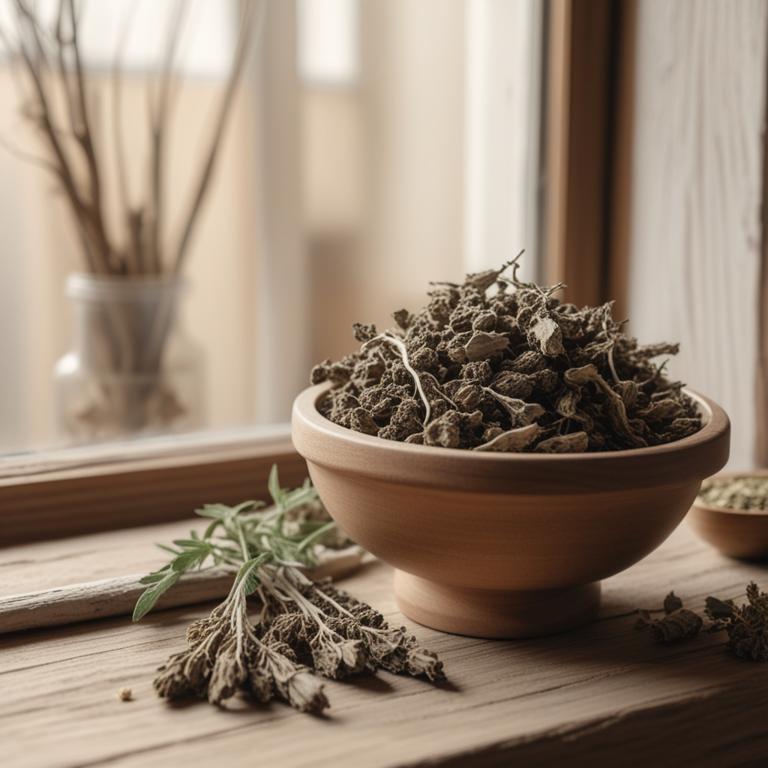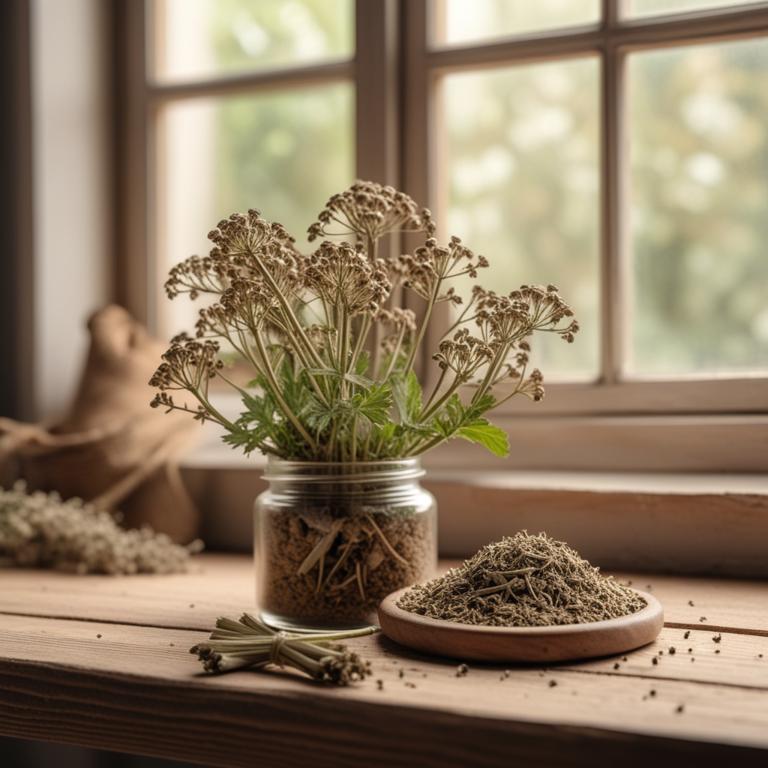Updated: Dec 1, 2024
Natural Treatments for Congestive Heart Failure: Medicinal Herbs and Herbal Preparations

Congestive heart failure is a condition where the heart can't pump enough blood to meet the body's needs.
This can lead to swelling, fatigue, and shortness of breath, making everyday activities a struggle. It's often caused by high blood pressure, coronary artery disease, or heart valve problems. When the heart can't pump properly, it can lead to a buildup of fluid in the body, causing swelling in the legs, ankles, and feet. This can also lead to shortness of breath and fatigue, making it hard to do simple tasks. If left untreated, congestive heart failure can lead to serious complications. There are some herbal remedies that may help alleviate some of the symptoms of congestive heart failure. For example, Hawthorn is a herb that's traditionally used to support heart health and improve blood flow.
It's often taken as a tea, or in capsule form. Another herb that's sometimes used is Ginkgo biloba, which may help improve blood flow and reduce inflammation. Some people also use Coenzyme Q10 (CoQ10), a supplement that's involved in energy production in the body. It's often taken as a capsule or added to food. Other herbs like garlic, turmeric, and ginger may also have benefits for heart health. Garlic may help lower cholesterol and blood pressure, while turmeric has anti-inflammatory properties. Ginger may help reduce inflammation and improve blood flow. These herbs are often used in teas, soups, or as supplements.
It's essential to talk to a healthcare provider before trying any new remedies, as they may interact with medications or have side effects.
Table of Contents
- What are the underlying causes of congestive heart failure?
- What are the advantages of herbal treatment for congestive heart failure?
- What are the most commonly used medicinal herbs for congestive heart failure?
- What herbal supplements are most often prescribed for congestive heart failure?
- What herbs can exacerbate congestive heart failure?
- FAQ
What are the underlying causes of congestive heart failure?
The main causes of congestive heart failure are related to the heart's inability to pump enough blood to meet the body's needs.
One of the leading causes is hypertension, also known as high blood pressure. When blood pressure is too high, it can put extra strain on the heart, causing it to work harder and eventually leading to heart failure. Another major cause is diabetes. People with diabetes are more likely to develop congestive heart failure because high blood sugar levels can damage the blood vessels and nerves that control the heart. This damage can weaken the heart and make it harder for it to pump blood efficiently. Coronary artery disease is also a significant cause of congestive heart failure. In this condition, the arteries that supply blood to the heart become narrowed or blocked, reducing blood flow to the heart muscle.
This can weaken the heart and reduce its ability to pump blood effectively. Heart valve disease is another common cause of congestive heart failure. When the heart valves don't function properly, they can prevent the heart from pumping blood efficiently. This can lead to a buildup of fluid in the lungs and other parts of the body. Cardiomyopathy, a condition in which the heart muscle becomes weakened and unable to pump blood efficiently, is also a leading cause of congestive heart failure. There are different types of cardiomyopathy, and some can be caused by genetic factors, while others can be caused by factors such as high blood pressure or coronary artery disease. Finally, cardiac arrhythmias, which are irregular heartbeats, can also contribute to congestive heart failure.
When the heart beats irregularly, it can be less efficient at pumping blood, leading to a buildup of fluid in the lungs and other parts of the body.
What are the advantages of herbal treatment for congestive heart failure?
Using herbs for congestive heart failure can bring several benefits.
One of the main advantages is that they can help reduce swelling and fluid buildup in the body, which is a common symptom of this condition. These herbs also have anti-inflammatory properties, which can help lower blood pressure and prevent further strain on the heart.
Additionally, they can improve circulation and increase oxygen delivery to the heart, making it easier for the organ to function properly. Some herbs may also have antioxidant properties, which can help protect the heart from damage caused by free radicals. Furthermore, using herbs may also reduce the need for medication and lower the risk of side effects associated with conventional treatment.
By reducing stress on the heart and improving overall heart function, herbs may help improve quality of life and increase longevity for those living with congestive heart failure.
What are the most commonly used medicinal herbs for congestive heart failure?

Herbs have been used for centuries to help people with congestive heart failure, and research has shown that some of them can indeed be beneficial.
One herb, Digitalis purpurea, or foxglove, helps improve the heart's pumping ability by increasing the force of each heartbeat. This is because it contains a compound called digoxin, which helps slow down the heart rate and make it stronger. Another herb, Ginkgo biloba, or maidenhair tree, helps improve blood circulation, which is essential for people with congestive heart failure. It does this by thinning the blood and improving its flow, which reduces the risk of blood clots and heart attacks. Garlic, or Allium sativum, is another herb that has been shown to help people with congestive heart failure. It contains compounds that help lower blood pressure and cholesterol levels, which reduces the strain on the heart. It also has anti-inflammatory properties, which can help reduce swelling and pain in the legs and feet.
Ashwagandha, or Withania somnifera, is an herb that helps reduce stress and anxiety, which are common symptoms of congestive heart failure. It does this by regulating the body's response to stress and promoting relaxation. This can help reduce the workload on the heart and improve overall well-being. Holy basil, or Ocimum sanctum, is an herb that has been used for centuries in Ayurvedic medicine to help people with congestive heart failure. It has antioxidant properties, which help protect the heart and blood vessels from damage. It also helps lower blood pressure and cholesterol levels, which reduces the risk of heart disease. It's worth noting that while these herbs may be beneficial for people with congestive heart failure, they should not be used as a replacement for medical treatment.
They should be used under the guidance of a healthcare professional, and in combination with other treatments.
What herbal supplements are most often prescribed for congestive heart failure?

Herbal preparations can be a great help for people with congestive heart failure.
A tincture is a concentrated liquid extract of herbs that can be taken in small amounts. It's good because it's strong and can be easily added to food or drinks. For example, hawthorn tincture has been shown to help improve heart function and reduce symptoms of heart failure. Decoction is another way to prepare herbs, and it's especially useful for roots and bark. These parts of plants are tough, so boiling them in water helps break them down and release their active ingredients. Decoction can be beneficial for congestive heart failure because it allows for the release of compounds like digoxin, which can help regulate heart rhythm. Herbal tea is a popular way to enjoy the benefits of herbs. It's made by steeping leaves, flowers, or other plant parts in hot water.
Tea can be soothing and relaxing, which is important for people with congestive heart failure who may experience stress and anxiety. For example, chamomile tea can help calm the mind and body, while peppermint tea can ease digestive issues that often accompany heart failure. Capsules are another form of herbal preparation. They contain dried and powdered herbs that can be taken in pill form. This is a convenient way to get the benefits of herbs without having to taste or smell them. Capsules can be especially useful for people who have trouble swallowing large amounts of liquid. For example, a capsule containing the herb Coenzyme Q10 can help boost energy levels and reduce oxidative stress in people with congestive heart failure. Infusion is similar to tea, but it's typically made with delicate herbs like flowers or leaves. It's a good way to preserve the natural flavor and aroma of herbs, and it's often used to make herbal remedies that are gentle and soothing.
For example, an infusion of rose petals can help reduce stress and promote relaxation, which is essential for people with congestive heart failure who may experience anxiety and depression.
Additional Resources:
What herbs can exacerbate congestive heart failure?
If you have congestive heart failure, it's best to limit your use of certain herbs that can worsen your condition.
One such herb is Ephedra sinica, which can increase your heart rate and blood pressure, putting extra strain on your heart. This can be especially problematic if you're already experiencing heart failure.
Pausinystalia johimbe, also known as yohimbe, has similar effects and can also cause blood vessels to constrict, reducing blood flow and making it harder for your heart to pump. Valeriana officinalis, or valerian root, may seem harmless, but it can also lower your blood pressure, which may not be a good thing if your heart is already struggling. Cola nitida, a plant related to cola nuts, contains compounds that can also raise your heart rate and blood pressure, making it another herb to be cautious with.
Rauvolfia serpentina, also known as Indian snakeroot, can lower your blood pressure and slow down your heart rate, but this can be counterproductive if your heart is already weakened.
FAQ
Are there any specific herbs that can prevent congestive heart failure?
Some herbs like hawthorn and Coleus forskohlii may help with heart health by improving blood flow and reducing blood pressure. Hawthorn is known to strengthen the heart muscle, while Coleus forskohlii can help relax blood vessels, making it easier for the heart to pump blood efficiently.
Is it safe to use herbal remedies for congestive heart failure during pregnancy?
Using herbal remedies for congestive heart failure during pregnancy can be risky.
Some herbs, like foxglove, can slow your heart rate too much and affect your baby's development. Other herbs, like licorice root, can increase blood pressure, which can be bad for your heart and your baby.
It's best to avoid them altogether.
Are there any herbs that can reduce the frequency of congestive heart failure?
Research suggests that some herbs may help reduce the frequency of congestive heart failure.
Turmeric, for example, has anti-inflammatory properties that may help ease heart strain.
Hawthorn is also studied for its potential to improve heart function by increasing blood flow and lowering blood pressure.
Can i combine different herbal remedies for congestive heart failure?
Combining different herbal remedies for congestive heart failure can be complex.
Some herbs, like hawthorn and garlic, may help lower blood pressure and improve heart function. But others, like foxglove, can actually worsen heart failure.
If you choose to combine herbs, be sure to research each one carefully and start with small doses to avoid potential interactions.
Related Articles

Hypertension and Herbal Remedies: Causes and Medicinal Herbs for Treatment

Gum Infection Causes and Medicinal Herbs for Natural Relief

The Causes and Herbal Treatments of High Blood Pressure

Varicose Veins: Causes, Medicinal Herbs, and Effective Herbal Preparations

Overcoming Low Blood Pressure: Causes, Herbal Remedies, and Effective Preparations






